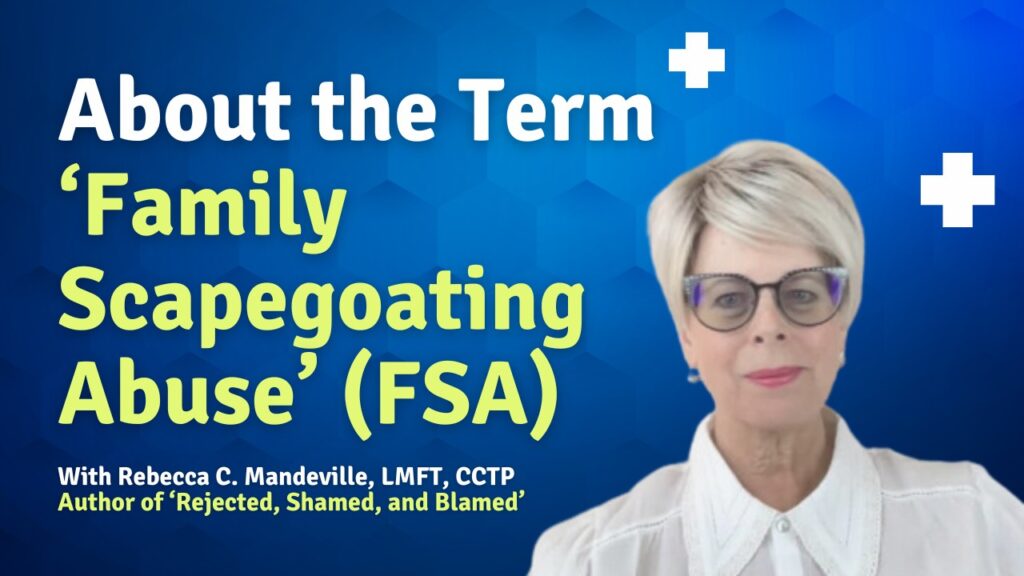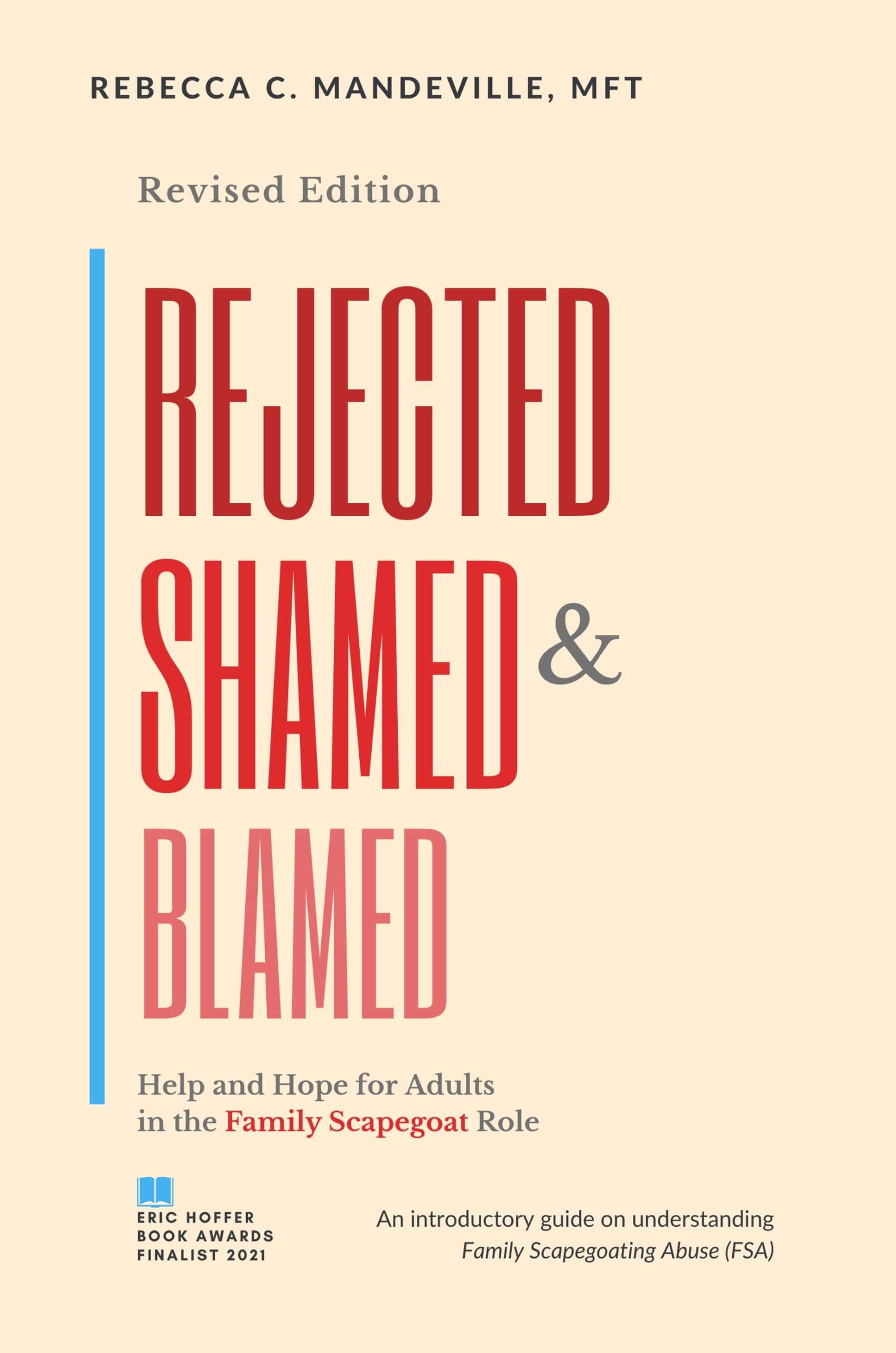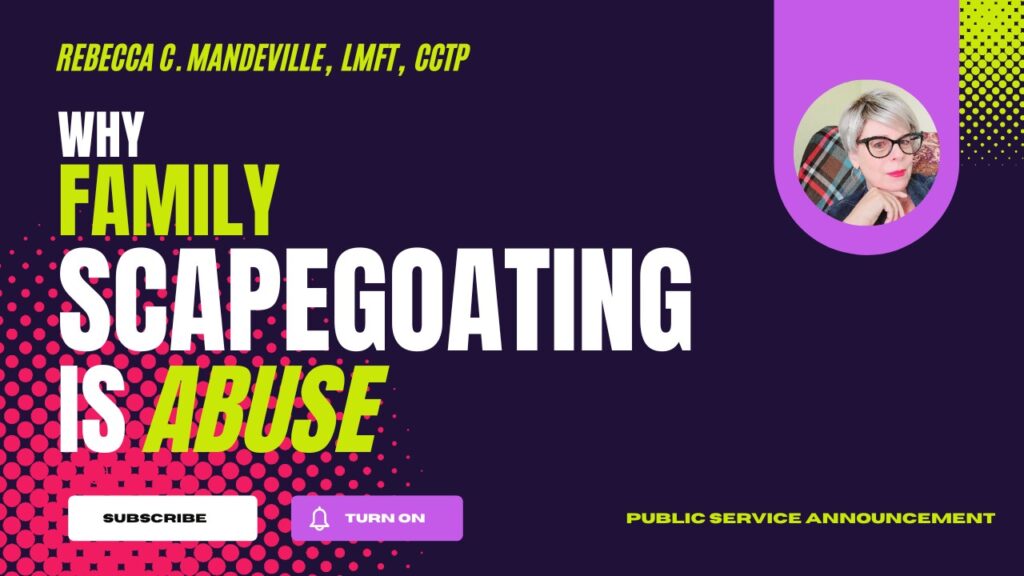In the intricate tapestry of family dynamics, there exists an overlooked, devastating phenomenon concealed in shadows – Family Scapegoating Abuse (FSA). FSA is like a silent, insidious stalker that preys upon vulnerable family members, leaving deep scars that often go unnoticed and unrecognized. In this article, clinician and researcher Rebecca C. Mandeville addresses why FSA warrants our collective attention, and what we can do to begin to effectively address it as a society.
UPDATE: My latest FSA quantitative study was published in the peer-reviewed journal, European Journal of Public Health Studies. Our second FSA study will be published later this year (2025). You can read the full study here: https://oapub.org/hlt/index.php/EJPHS/article/view/202/202
Family Scapegoating Abuse (FSA): Impact on Individuals
Scapegoating in families occurs when one family member is unfairly singled out, blamed, and shamed for the family’s problems or dysfunction. In family systems marred by multigenerational trauma, addiction, financial troubles, and/or mental health issues (including narcissism), one family member becomes the ‘scapegoat’ via pathological Family Projection processes, resulting in their bearing the weight of the family’s collective blame and resentment.
But that’s only the beginning of the story when it comes to family scapegoating dynamics.
The consequences of being scapegoated by one’s family-of-origin are profound and enduring. Imagine growing up feeling like you’re inherently flawed, unworthy of love, and destined to fail. How about having your sanity questioned and being called “crazy,” “emotionally ill,” “mentally ill,” or “a liar” by family members when you dare to challenge a false family narrative? Or being told that you’re “difficult” or “too sensitive” or “can’t take a joke” when you are the target of cruel jokes and sarcasm?
Having to had to endure such behaviors throughout childhood and at times into adulthood, child victims and adult survivors of family scapegoating behaviors will often battle low self-esteem, anxiety, depression, complex trauma symptoms, and a persistent sense of alienation from others, which can affect them life-long.
How My Research on FSA Began
My journey into the heart of FSA began with my own personal experiences and observations. Later, as a licensed Family Systems therapist and University Professor, I encountered numerous clients and Grad students grappling with the aftermath of being scapegoated within their families.
The effects of scapegoating on children and adult survivors sparked a curiosity that eventually propelled me into years of rigorous qualitative research, culminating in the identification of the dysfunctional systemic phenomenon I eventually named Family Scapegoating Abuse (FSA), as described in my introductory book on FSA, Rejected, Shamed, and Blamed: Help and Hope for Adults in the Family Scapegoat Role.
In publishing my introductory book on FSA, my primary intention was to emphasize that scapegoating in families can in fact be a form of individual and systemic psycho-emotional abuse that can have a devastating impact on child victims and adult survivors.
It is also important to note that FSA is not always ‘just’ psycho-emotional. It can be physical as well. For example, I’ve had reports of adult siblings physically assaulting the scapegoat target, including being pushed down stairs or lunged at and beaten. My article on Family Mobbing highlights some of the more aggressive aspects of FSA that were shockingly prominent in my original Family Systems research.
Scapegoating can also occur as a result of sexual abuse, whereby the perpetrator needs to ensure their victim is not a believable reporter should they ever “tell the (family) secret.”
FSA Gains Global Attention
My research on FSA has brought global attention to a form of abuse that often thrives on secrecy and shame. By unraveling the dynamics of FSA, I have been able to identify patterns, risk factors, and interventions to support FSA adult survivors in recognizing what type of abuse they are suffering from – and needing to recover from.
The FSA research studies I’ve conducted to date have also revealed alarming prevalence rates of FSA across diverse cultural and socioeconomic backgrounds, underscoring the universality of this issue. It transcends cultures, races, and socioeconomic statuses. Therefore, continued global efforts and collaboration are essential to combat this pervasive issue. Whether it’s in suburban America or rural India, the trauma inflicted by FSA leaves indelible marks on individuals and communities alike.
Today I’m pleased to share that my FSA research tools and methodologies are being used around the world – most recently as far away as Zambia, where I am co-authoring two FSA-focused quantitative studies with MD and Research Fellow Dr Balapala Kartheek. Learn more about the latest research being conducted on FSA and how this will benefit adult survivors and treating clinicians.
Knowing that my work on FSA is now having global reach and impact will hopefully reassure adult survivors of this long-neglected, under-researched form of systemic abuse that what they have long been suffering from is at last being recognized within the Mental Health field as well as in Academic circles world-wide, further legitimizing their genuine trauma and pain.
Advocacy and Support for FSA Adult Survivors
By bringing FSA into the spotlight, we empower adult survivors of this form of abuse to speak their truth, seek support, and break free from the cycle of shame and abuse. Advocacy efforts and support networks play a pivotal role in raising awareness, providing resources, and demanding policy changes to protect victims impacted by systemic familial abuse.
My website, Family Scapegoating Abuse (FSA) Education™, has for many years now offered a lifeline to those grappling with the aftermath of FSA via the FSA resources I provide, which include my FSA Recovery Coaching℠ services, free educational articles on FSA, and a platform for advocating for adult survivors of this type of familial abuse via the written contributions of interested Clinicians and FSA adult survivors.
I also now offer a Community-focused Substack, Family Scapegoating Abuse Education, where FSA adult survivors who opt to upgrade to a paid subscription can engage as a community via comments, discussion threads, and live chats.
In the journey toward healing and justice, let us not turn a blind eye to the silent suffering experienced by children and adults experiencing the devastating impact of FSA. With education and support, adult survivors can break free of the shackles of toxic shame, betrayal trauma, and traumatic invalidation and begin to heal from the devastating impact of being ‘rejected, shamed, and blamed’ by their family-of-origin.
Whether you’re a survivor, a treating clinician, or a researcher interested in FSA, the time has come for us to stand together and raise our voices to work towards a world free from the shadows of insidious systemic abuse in all its forms.
Together, we can break the chains of FSA and build a future where the damage caused by this form of familial abuse is recognized so that survivors can have access to appropriate resources and treatment modalities, including treatment for complex trauma (which, per my FSA research, many FSA adult survivors unknowingly suffer from).
As we champion the cause of FSA on behalf of adult survivors around the world, let us heed the call to action and ensure that the voices and stories of FSA adult survivors resonate far and wide, ushering in a future where every individual is seen, heard, and valued within the sanctity of their own family.
Watch My YouTube Channel on How the Term Family Scapegoating Abuse (FSA) Came To Be

Check Out My Book on FSA, Rejected, Shamed, and Blamed


Watch My Public Service Announcement Video on FSA
If you’d like to add your voice to this conversation, feel free to do so via the ‘Comments’ section, below.
Copyright 2024 | Rebecca C. Mandeville | All Rights Reserved


Comments are public – Please do not leave sensitive or identifying information.